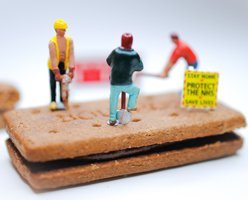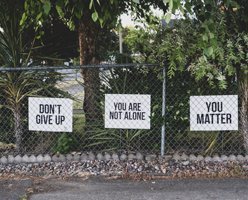Reading time: Less than 5 minutes
Ever wondered how to overcome writing anxiety? If that’s an issue you face, here’s some detailed advice on how to respond…
While many people believe the most common health issue facing the developed world is depression, in fact, the biggest challenge is something else. It’s anxiety.
Anxiety disorders are, in fact, the most common form of mental illness in society, affecting 40 million adults in the United States age 18 and older, or 18.1% of the population every year.
There are anxiety disorders in my family, although I’ve been lucky enough to escape that hammer. Still, I’ve worked with many clients who’ve had to deal with the specific and fearsome monster of writing anxiety.
Yes, it’s a real thing. Go to Google Scholar and you’ll get more than 2 million hits from peer-reviewed journals. I started thinking more about writing anxiety disorder when I read the lovely memoir by Mark Saltzman, The Man in The Empty Boat, outlining the author’s many-year struggle with writing anxiety.
What writing anxiety looks like
Writing anxiety disorder usually presents as physical symptoms: your palms start to sweat, your heart beats as though you’re in a marching band, you feel dizzy and light-headed.
Some people even get panic attacks. And of course, these physical symptoms quickly morph into a desire to procrastinate. Many anguished writers tell me they’re lazy, but I know this isn’t true.
Procrastination, in fact, is usually a logical and intelligent reaction to what life is throwing at you. For example, if you were told to hit your head against a brick wall — and actually did it — you’d probably get a headache and your head might bleed. Both troubling occurrences would make you want to procrastinate about hitting your head.
In other words, you’d be making an intelligent decision to procrastinate, not a lazy one.
The same is true of writers facing anxiety. They don’t want to write because the work makes them feel too uncomfortable to bear.
If you believe writing anxiety is a challenge you might face, here are nine ways to manage the issue:
1-Deal first with any physical challenges you’re facing
Pay particular attention to dehydration, hunger and lack of sleep. These may be the straws that break the camel’s back. I have an old friend who has hay fever (trust me, this story is relevant.) During the spring, when pollen is at its peak, he also finds he is allergic to beer and chocolate. Of course, he is allergic to beer and chocolate all year – cue sad violins — but he doesn’t feel the effects of these allergies when he’s not overwhelmed by hay fever.
Don’t let relatively easy-to-deal-with challenges — like getting enough food or sleep — tip you over into writing anxiety.
2-Start small — very small

The heart of the problem is they’re expecting too much of themselves. When I accept people into my writing group, I encourage them to begin with writing no more than 15 minutes of writing a day. The small goal reduces negative feelings and dramatically increases their odds of success. And that makes them far more likely to succeed the next day.
As well, lower the stakes by promising yourself that all you need to write is a crappy rough draft.
3-Use writing rituals
Rituals such as time of day at which you write, the place where you write, or what you do before you write will all help make writing seem like a supportive and friendly habit, rather than a burden.
Such rituals — whether they require having a super clean desk, or having your pencils sharpened just so — decrease stress, increase your power and make the writing process seem easier.
4-Try some new tactics
But if the rituals are no longer working for you, then change them. If you’ve typically written at your desk, then take your laptop and write under a tree. Or in a library. Or in a coffee shop.
If you usually write for 30 minutes, try 15. Or five. Or even one. (There’s no amount of writing time that’s too small. Writing even 20 words is still and accomplishment, and always better than writing zero words.)
5-Get some exercise

You don’t have to run five miles. Even a brisk 20-minute walk will help. Make the exercise something you enjoy, rather than dread. And if you’re of the school of thought that all exercise is loathsome (I know my father-in-law felt this way) then start with exercising for a single minute. Soon enough, you’ll be able to increase that time, ever so gradually.
6-Stop judging yourself
Many people with writing anxiety disorder suffer acutely under the unwaveringly harsh judgement they make of themselves and their writing. Instead of trying to convince yourself that you’re “not a bad writer,” I suggest you simply shut down the urge to evaluate.
Don’t allow yourself to even consider the notion of whether your writing is good, bad or indifferent. When you’re writing, your only job is to write, not to evaluate. I’ve written before about how to break the habit of editing while you write. Breaking this habit is especially important for anyone facing writing anxiety. The time for evaluating should come only after writing and after incubating. In other words, procrastinate about editing!
7-Meditate
I know some people think that meditation is really hard, perhaps even a little bit frightening. First, understand that meditating is not about “emptying” your mind, it’s more about observing it. Also, it’s possible (indeed, wise) to start very small – with no more than five minutes.
Many writers find meditation to be a supremely helpful practice. I give detailed instructions in another blog post and I also encourage you to check out the book 10% Happier by Dan Harris. But if mediation seems too much for you, consider simply monitoring your breathing.
8-Consider Cognitive Behavioural Therapy techniques

CBT is not a type of positive thinking. Instead, it focuses on challenging your negative thoughts and making a rational plan for how to face them.
So, for example, if you feel unable to write because the project feels too big and overwhelming for you, you learn to divide the project into smaller, more manageable steps. Or you learn to review articles you’ve successfully written in the past, to buoy your spirits.
You don’t even have to see a therapist to do CBT. There’s a tremendous workbook called Mind Over Mood, that can teach you to do it for yourself. In a previous post, I’ve outlined a 7-step procedure given in the book that will help writers manage their own negative automatic thoughts.
Try it! This process really works.
9-Understand that everyone encounters obstacles while writing
Everyone faces the same problem you’re struggling with. Even professional writers. Don’t adopt a “poor little me,” or an “I’m the only person in the world who feels this way,” attitude. Facing blocks, dealing with problems, struggling with words and sentences are the name of the game for all writers. This is just what we do.
Consider yourself an apprentice and understand that, like all apprentices, you need to learn how to deal with specific challenges. This need doesn’t make you inept or a bad writer. It just makes you someone who needs to learn more.
You can learn to manage writing anxiety
Don’t try to overcome writing anxiety. Instead learn about managing writing anxiety. We all get better — at everything — with practice. Negative or difficult experiences don’t have to box you into a corner.
Instead, let writing be an escape for you. Something you do to express yourself and to play. Don’t let writing anxiety stop you from getting the practice you need to become a better and more confident writer.
This is a substantially updated version of a post that first appeared on my blog June 16/20.
*
My video podcast last week addressed how to stay committed to your book. Go here to see the video or read the transcript, and you can also subscribe to my YouTube channel.
*
Need some help developing a sustainable writing routine? Learn more about my Get It Done program. If you already know you want to apply, go directly to the application form and you’ll hear back from me within 24 hours.
*
Have you struggled with how to overcome writing anxiety? We can all learn from each other so, please share your thoughts with my readers and me in the “comments” section below. Anyone who comments on today’s post (or any others) by Aug. 31/23 will be put in a draw for a digital copy of my first book, 8 1/2 Steps to Writing Faster, Better. Please, scroll down to the comments, directly underneath the “related posts” links, below. Note that you don’t have to join Disqus to post. See here to learn how to post as a guest. It’s easy!


